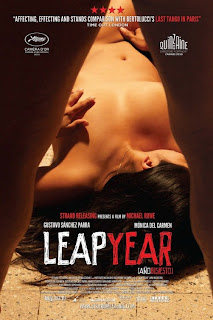Review: "Spirited Away"
 NOTE: The following was originally published as part of the Hayao Miyazaki retrospective at In Review Online:
NOTE: The following was originally published as part of the Hayao Miyazaki retrospective at In Review Online:Long before I became a film critic, I spent several summers working as an assistant teacher in a daycare for school age children. They were an unruly bunch, prone to frequent misbehavior and general obnoxiousness, not a group of kids that were easily tamed. After lunch was always movie time, and while they had the option of either taking a nap or watching the movie, it was always a struggle to get them all to settle down for that long. That is, until one day, when I brought in Hayao Miyazaki’s "Spirited Away." For two hours, those children sat in total silence, enraptured by the magic of Miyazaki’s brilliant imagination. As soon as it was over, they demanded to see it again immediately, and they wanted to watch it again the next day, and before I knew it, kids were coming in telling me they had gotten their parents to start buying them the Miyazaki oeuvre on DVD. I guess that makes me somewhat of a Miyazaki evangelist, and I have never had an unhappy convert. Which is one of the great things about his films: after someone is introduced to his work they never regret it.

Even for a man whose work includes such great films as "Castle in the Sky" and "Princess Mononoke," "Spirited Away" should be considered his supreme masterpiece. Never before or since has he reached quite this level of sweeping grandeur, subtle beauty, emotional depth, and delightful whimsy. It's a film that presents a fully realized and fleshed out world, where a little girl named Chihiro suddenly finds herself trapped after her parents take an unexpected detour on their way to their new home. Forced to work for an evil witch named Yubaba in a bath house for the spirits, Chihiro puts her nose to the grindstone in order to save her parents who have been turned into pigs. Along the way, she makes friends with Yubaba’s young assistant Haku, and a servant named Rin, all the while endearing herself to all those around her, picking up friends and followers wherever she goes.
More so than any other director working today, Miyazaki has a keen eye for how children think, especially young girls. Here, Chihiro is on a journey to adulthood (the opposite premise of his next film, "Howl’s Moving Castle," which centers around a quiet and proper young girl who is transformed into an old woman, and who must figure out how to become young again). Chihiro begins the film as a timid and lonely little girl, on her way to a new home she does not want to go to. But, by the end, she's strong, confident and a wholly different person. Unlike the protagonists of many children’s films, Chihiro has a completely fleshed out character arc. Miyazaki always demonstrates a remarkable eye for detail, from the way a character puts on their shoes to the bustling backgrounds of a spirit bathhouse. Along the way he even includes allegorical environmentalist messages, in the form of the river spirit Chihiro rescues from being clogged with garbage and debris, and eventually later in the revelation of a character’s true identity.
 Living in an age where computer animation seems to be all there is, it’s refreshing to see a film like this that is only augmented by these techniques and first and foremost hand drawn. "Spirited Away," like all Miyazaki’s films, is a gorgeous work, and Joe Hisashi’s sweeping and beautiful score is perhaps the composer's finest achievement. There is an emotional resonance and depth of character here that simply isn’t found in most children’s entertainment, which is what makes Miyazaki such a rare and special talent – if he can tame the wild children I was once in charge of, he can do anything. The grand, fantastical power of "Spirited Away" doesn’t just lie in its scope and spectacular magic, but in the subtlety of its characterizations and the complete originality of its story. Miyazaki brings each character to life with such breathtaking detail and gentle empathy that it sucks the viewer right in, holding them in his spell until the very end. Not only is this a benchmark in Japanese animation, but it’s a benchmark of modern filmmaking, period. A venerable modern classic for both the young and the young at heart.
Living in an age where computer animation seems to be all there is, it’s refreshing to see a film like this that is only augmented by these techniques and first and foremost hand drawn. "Spirited Away," like all Miyazaki’s films, is a gorgeous work, and Joe Hisashi’s sweeping and beautiful score is perhaps the composer's finest achievement. There is an emotional resonance and depth of character here that simply isn’t found in most children’s entertainment, which is what makes Miyazaki such a rare and special talent – if he can tame the wild children I was once in charge of, he can do anything. The grand, fantastical power of "Spirited Away" doesn’t just lie in its scope and spectacular magic, but in the subtlety of its characterizations and the complete originality of its story. Miyazaki brings each character to life with such breathtaking detail and gentle empathy that it sucks the viewer right in, holding them in his spell until the very end. Not only is this a benchmark in Japanese animation, but it’s a benchmark of modern filmmaking, period. A venerable modern classic for both the young and the young at heart.
GRADE - ★★★★ (out of four)



Comments